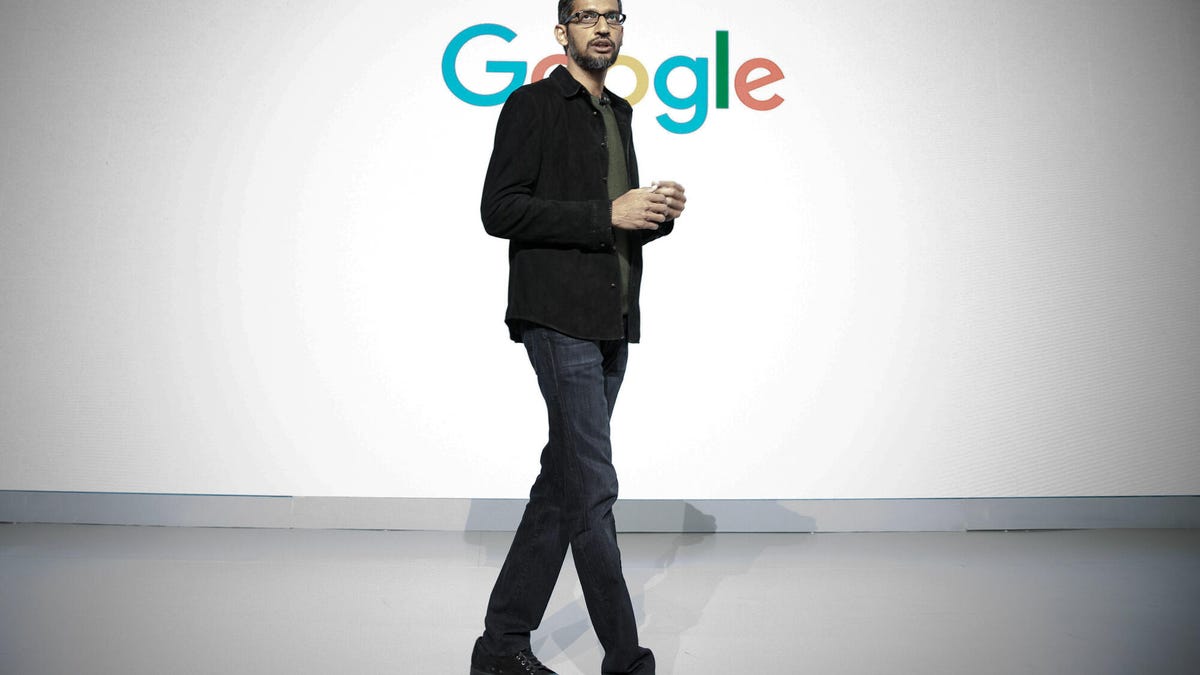What Sundar Pichai taking over the Google universe means for search, Android and Nest
Commentary: Larry Page and Sergei Brin are riding into the sunset at a critical time in the development of Google products.

Sundar will be the CEO of both Google and Alphabet
At a time when Google is facing critical questions about privacy, China, the way it treats its employees and the integration of acquired brands such as Nest, its co-founders Larry Page and Sergei Brin have decided to step aside from the day-to-day management of Google's parent company Alphabet. The destiny of the company -- and all of its thorny challenges -- are being handed over to Google CEO Sundar Pichai , who now also takes the wheel as Alphabet's chief executive.
Let's not forget that what also hangs over Google's future is the spectre of the US federal government taking a stronger hand in the regulation of technology companies in the years ahead. Page and Brin likely see a future that's a lot less fun, freewheeling and creative -- but demands more discipline, corporate governance and bureaucracy. As CNET's Rich Nieva reported, there's fear from the rank-and-file that this will also be the death of Google's famous "open culture."
So what does it all mean for the Google products that so many of us rely on every day? Let's take a look at the impact on its three big categories.
What it means for Google search and services
Despite all the flashy things Alphabet and Google do around self-driving cars , fiber broadband, internet balloons and "other bets," the Google search engine and the massive advertising revenue it generates still pays virtually all the bills for the company. The vast majority (over 70%) of the company's revenue comes from search, although YouTube is becoming a much bigger contributor and the company's enterprise offerings in cloud computing and artificial intelligence are also growing.
Still, don't expect Pichai to change much with search, Google Maps , Google Apps or YouTube -- other than to continue their course of incrementally adding new improvements. The entire company hinges on the continued success of these services, so expect Pichai and his leaders to be very conservative in how they manage them. The biggest challenges are well known: how to deal with international government regulations, backlash from parents and health providers over screen time and how to work within the laws of authoritarian regimes when it comes to censorship and handing over data on dissidents, who are often fighting for democracy and human rights.
What it means for Android and Google devices
Pichai rose to prominence as the leader of the team that created the Chrome web browser and Chrome OS devices such as the original Chromebook Pixel laptop. When his role expanded to include the leadership of the Android team in 2013, most of us expected Chrome OS and Android to merge into one. The fact that it never happened tells us something about Pichai's pragmatism.
Despite fears that Google could eventually sideline Android and put most of its focus on Chrome OS -- where it has more control and makes more money -- Google has not only kept pace in upgrading and simplifying the Android user experience, but it's also invested in Android hardware by creating its own Pixel phones . Google has never deeply invested in marketing Pixel devices, however, likely out of fear of cannibalizing sales from important Android partners like Samsung .
As Alphabet CEO, Pichai will now come under more and more pressure from Wall Street to diversify Google's revenue. That will resurface the questions of whether Google should aggressively market its own Pixel devices at the expense of its partners or if it should evolve its mobile strategy from Android to Chrome OS-powered phones. Either option would be disruptive to loyal Android users.
What it means for Nest and Google Assistant
Google unified manyof its smart home products under the Nest brand in 2019, including its smart speakers and its Wi-Fi routers. Nest had originally operated independently within Google, but it's now been folded into Google's hardware division, essentially replacing the " Google Home " brand. Nest has basically become the Pixel brand of the smart home.
The way that Pichai has handled that -- after Nest bounced around inside Google and Alphabet for a few years -- again shows his pragmatism. In this case -- unlike with Android and Chrome OS -- it no longer made sense to have two brands and two teams working on similar stuff, so they've been combined.
Meanwhile, Google Assistant maintains its current branding because it's the voice version of traditional Google search, and spreads its wings across other platforms beyond smart home -- especially phones. The power of the Google brand itself remains one of the company's greatest assets, and it will be important to watch the way Pichai -- and the new regime he's likely to put in place at Alphabet -- chooses to use it in the years ahead.
And the 'other bets'
Now that Pichai is in charge of Alphabet's experimental projects like Jacquard smart fabric, Loon internet, Google Fiber, Waymo and other assorted oddities, it will be critical to watch if his pragmatic approach can shepherd these projects into real world products -- beyond just the curiosities they've been under Page and Brin.

